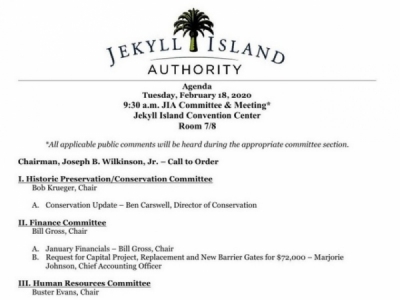
Posted on February 23, 2020
The days are numbered for the crossover at Jekyll Island’s Corsair Beach Park.
Noel Jensen, Jekyll Island Authority chief operations officer, told the JIA Board of Directors that the crossover was meant to be compliant with the Americans with Disabilities Act, but with changes to the dune field from hurricanes and the subsequent reestablishment of dunes, Mother Nature is essentially trying to build a sand dune on the ramp and being pretty successful at the job.
The situation doesn’t get better below the ramp — sand accreting under the crossover is pushing boards up and out, and if left alone will pop them off entirely. The third strike comes with the dune building at the base of the crossover. It’s not only several feet in both height and width, but it’s also attracted vegetation, and that process will only continue.
Jensen said this is a war with the natural process of the beach that is both unwinnable and expensive, as it cost hundreds of dollars to continually send out staff to shovel off the sand.
“We gave it a really good effort here,” Jensen said, while pointing out there continues to be an ADA-compliant and actively maintained crossover at the Westin a few hundred feet north.
Discussions between JIA and state Department of Natural Resources staff led to the agreement the best way to maintain a crossover at the site is to reconstruct it three and a half feet taller, with stairs leading to the beach. DNR indicated the agency wouldn’t be able to permit the type of ramp that would be necessary, so it had to be stairs.
“It’s an unfortunate situation, but at this point, that’s what we’re faced with,” Jensen said.
JIA Executive Director Jones Hooks said there will be a public discussion about the project at an as-yet undetermined time. The plan to raise the crossover and add stairs is currently going through the permitting process.
Hooks also mentioned that efforts continue to try to restore the wetland at Fortson Pond.
Infrastructure construction on the island from the 1950s through the ‘70s led to fragmentation of First Creek and the creation of the 4.5-acre Fortson Pond near the entrance to the island. JIA conservation staff’s worked on a gradual process of marsh restoration for the past seven years. According to the JIA, an abundance of trapped nutrients in the pond led to the development of a year-round algae bloom that’s detrimental to area water quality and wildlife.
“We’ve done all the baseline assessments to demonstrate that yes, this area really does need to be restored,” said Ben Carswell, JIA conservation director.
He said modeling shows if they put some big culverts under Fortson Parkway, that would go a long way to restoring the health of the area, but that’s a big-ticket aspect of the effort for which they don’t yet have the money. Carswell said they’ve sought grants to try to fund it, which would be around $800,000.
However, they are moving forward with a coastal incentive grant to fund some smaller associated projects, and trying to secure funding through the Army Corps of Engineers’ continuing authorities program. This program allows the Corps to develop certain types of water resources projects without additional project-specific congressional authorization.
Moving ahead, the board approved $72,000 for new barrier gates around the Historic District, $17,364 for replacement of storm water pumps at St. Andrews Beach Park awarded the supply records management contract to Infolinx and put out a request for proposals for the Hollybourne Cottage display design.
Infolinx said for the software and hosting system, they would charge $89.500 for the initial first year costs and $33,000 annually thereafter.
“I do believe what you approved today for the records management is going to be very significant and going to bring us forward into a much better position than we’ve been in with our records management,” Hooks said.
The Hollybourne RFP is for professional museum planning services for the interpretation of the cottage. Due date for proposals is March 20. Hollybourne is the only cottage in the Historic District from the club era that isn’t fully restored, and JIA’s never put it into active use. The plan is the company that receives the contract will be able to turn all that around.
“I’m very excited we’re beginning to move that project, now, to the next step,” Hooks said.
He added that the cottage has a lot of appeal and should be good in generating interest in the Historic District.
The board considered taking a stance on short-term rental legislation that’s presently active in the state House of Representatives, but instead resolved just to keep an eye on it as it moves through the legislative process. House Bill 523 would prohibit local governments from regulating short-term rentals like people rent through Airbnb and Vrbo. It would also ban registration for these properties.
In a memo to the board, Hooks wrote, “Registration of rental units on Jekyll allows for rentals to be inspected to assure basics such as smoke detectors and safety requirements. Over the years, the Authority has received many complaints from visitors and rental guests when homes were rented with safety problems and without proper appliances and furnishings, as listed in their published rental descriptions.
“A result of a residential rental registration program, approved by the Jekyll Island Authority Board, complaints have all but disappeared. Additionally, we seldom receive a complaint from homeowners who rent on Jekyll.”
He said statistics indicate more than 50 percent of the homes on the island are rental properties.
Work also continues on the beach lighting ordinance changes. DNR and JIA staff are scheduled to be on hand for an ordinance public participation session March 12 at McCormick’s Grill, 4:30-6 p.m.
Source: thebrunswicknews.com





